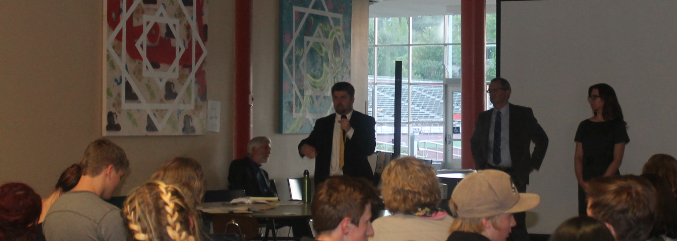Courageous Conversation Discusses Rape and Rape Culture
In the United States, someone is raped every 107 seconds. This and other information regarding rape and sexual assault were presented on May 6 in the cafeteria by invited professionals.
The speakers included Phil Zerzan, the chief of police at Portland State University (PSU); Jessica Amo, the director of PSU’s Women’s Resource Center; and Dave Hannon, Multnomah County Deputy District Attorney.
The three were invited as part of a speaker series called “Courageous Conversations,” organized by Lincoln’s parent and administrator-run Health Action Network, which take place once every quarter.
Each speaker discussed a particular topic related to sexual violence. Zerzan spoke about violence specific to college campuses and the manners in which universities are combatting it. Amo helped to define sexual consent, why women often fail to report violence, and resources for victimized women to recuperate and seek justice. Finally, Hannon addressed the legal definition of rape and some of the barriers that sexual assault victims are faced with when they do try to seek justice.
Zerzan emphasized that seual assault can take many forms, despite typical misconceptions about what rape really is.
“When people think of sexual assault or rape often what comes to mind is […] the bushy-haired stranger jumping out of the bushes and while that does happen, that is probably the most rare form of sexual assault that occurs on a university campus,” Zerzan said. “Most of the time when you’re talking about sexual assault on campus, you’re talking about people that are known to each other; that’s the vast majority of crimes.”
Another aspect of rape that was lengthily discussed was consent, its definition and how to promote it among young people. especially adolescent males.
Amo helped the audience identify all the reasons that consent might not exist in many sexual encounters. In other words, what causes sexual assault?
The list was long, but included drugs, alcohol, the media, expectation of sexual favors, fear, and, most importantly, a misunderstanding of what consent is.
Another troubling issue was the hesitation that many sexual assault victims face in seeking help.
“Usually, people come in saying ‘I can’t believe I put myself in this position and I can’t tell anybody,’” Amo said.
The legal definition of rape was also discussed. Under Oregon law, “rape” is defined as any sexual act that uses forcible compulsion or threat on part of the instigator or mental incapacitation or physical helplessness on part of the victim.
The Courageous Conversation brought in around 70 parents, students and faculty. Health action network co-chair and Lincoln parent Eleni Kehagiaras was pleasantly surprised by the attendance.
“It was a really good student turnout,” she said. “We’re not unhappy with it”
The audience’s engagement with the speakers and the topic are what really distinguished the event, according to Kehagiaras.
“I think it really was dependent on the interaction of the people here listening and there were a lot of really good questions in the beginning from students which helped perpetuate the conversation,” she said. “It really allowed the audience to sway the conversation to what was most pertinent to them.”
Sophomore Mya Abruzzizi, who attended the event, found the topic of the utmost importance.
“I am obviously very passionate about preventing sexual assault and about the fact that there are a lot of people whose ideas are not heard,” she said. “We have to find a way of attacking the problem.”

